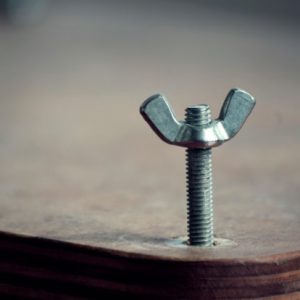wing nut
or wing·nut
noun
Origin of wing nut
Words nearby wing nut
ABOUT THIS WORD
What does wing nut mean?
Wing nut is an insulting slang term for a person who’s considered eccentric or who has extreme political views.
In a completely different context, wing nut is also a term for a nut (a piece of usually metal hardware that attaches to a bolt) with two tabs on its sides that kind of look like wings. The “wings” make turning the nut by hand easier when it’s being attached to a bolt. It’s also called a butterfly nut (because of the “wings”) or a thumbnut (because it can be easily turned with the thumb and forefinger).
Both senses of the word can also be spelled wingnut and wing-nut.
The only connection between the two senses of the word is probably the word nut, which can be used to refer to a person considered eccentric (someone who is nutty). However, nut can also be used as a negative slang term for a person who is mentally ill, and wing nut can also imply this. Keep in mind that when used in this way, these terms may reinforce harmful stereotypes and associations with mental illness.
Example: Every local government meeting has a few wing nuts who show up to spout off conspiracy theories during the public comment session.
Where does wing nut come from?
The first records of wing nut referring to the piece of hardware come from the 1900s. When it refers to an eccentric person or a political extremist, its origin is less certain. In those cases, it makes use of the sense of nut referring to an eccentric or insane person.
In its political sense, wing nut is probably based on the use of the terms right-wing and left-wing in the discussion of polarized politics, especially in the U.S. A person considered to have an extreme ideology might be insultingly labeled a right-wing nut or a left-wing nut. Today, the term wing nut is often applied without specifying the “wing” being referred to, as in Commentators labeled the senator a wing nut for his extreme views on foreign policy. Use of wing nut in this way gained popularity in the late 1900s and early 2000s.
The term is also used outside of politics as a mostly negative term for oddballs or crackpots, as in I avoid reading the comments because it’s mostly trolls and wing nuts.
The wings on literal wing nuts make them easier to screw onto bolts with your fingers, but they also make it so that the nut can’t be tightened with tools like socket wrenches. For this reason, wing nuts are usually used in things that need to be quickly adjusted or frequently assembled or disassembled, but that do not require the connection to be as tight as it could be.
Did you know ... ?
What are some other forms related to wing nut?
- wingnut (alternate spelling)
- wing-nut (alternate spelling)
What are some synonyms for wing nut?
What are some words that share a root or word element with wing nut?
What are some words that often get used in discussing wing nut?
How is wing nut used in real life?
When it refers to extremists or eccentrics, wing nut is always used negatively, usually as a dismissive insult.
Could we use a wing nut with Loctite to secure the LJ Wing bottom headers for shipping?
— Jeffrey Wilson (@MestekJeff) June 18, 2009
the worst part about 5g conspiracy theories is that it's going to be really hard to not sound like a wingnut when you tell them how it actually interferes with weather predictions
— peek (@PK_PDX) April 6, 2020
Maybe the most ethical way I could spend my 40s is starting a fake crazy wingnut late night radio show that slowly edges paranoid people towards non-destructive weirdness like geodesic domes
— rstevens 🐳💨 (@rstevens) September 11, 2019
Try using wing nut!
Which of the following words is least likely to describe a person considered a wing nut?
A. reasonable
B. kooky
C. extreme
D. nutty
Example sentences from the Web for wing nut
“Close those shutters and screw down the wing-nut hard,” he said, hanging the lamp close beside the door.
Lorimer of the Northwest |Harold BindlossThe holding screws for the vane and tripod mounting are rather crudely hand cut with wing-nut ends.
Early American Scientific Instruments and Their Makers |Silvio A. Bedini

